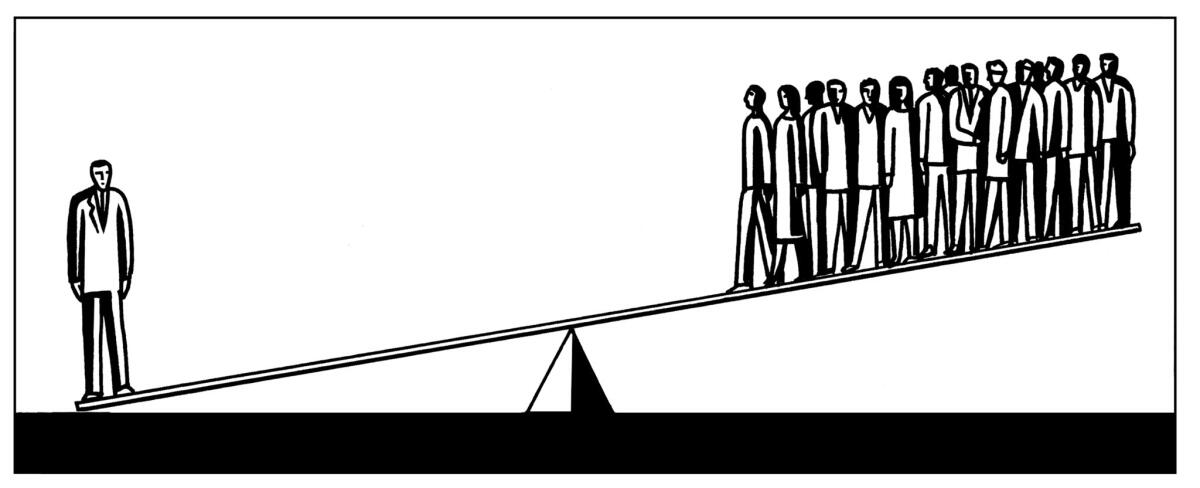Opinion: The case for higher wages: It’s smart business

- Share via
Aetna Chief Executive Mark Bertolini announced last month that the insurance giant would hike wages for low-level employees to at least $16 an hour and eventually lower healthcare costs for some workers. The reason? In part, Bertolini wants to cut into the $120 million the company spends each year hiring and training new workers to replace those who quit.
But more important, he said, it is the right thing to do. “Companies are not just money-making machines,” Bertolini told the New Yorker’s James Surowiecki. “For the good of the social order, these are the kinds of investments we should be willing to make.”
Holy Thomas Piketty!
Bertolini is right (even if his firm has made some other missteps). Globalism, the casualization of labor (replacing full-time employees with contractors and part-timers) and a zealous fixation on profits above all else have left the American middle class in shambles. That’s a dangerous thing for a consumer economy.
And ultimately it’s not particularly good for a business to pay its workers the lowest possible wage. A substantial amount of research shows that a well-paid workforce is a happier and more productive workforce, with long-range benefits for the business. Of course, that’s contrary to the short-horizon investment pressure from Wall Street and the crass greed in executive suites, where most of the nation’s economic gains of the last five years have wound up.
Bertolini’s stance puts him in company with the leadership at Costco, Trader Joe’s, the Container Store and even tiny Moo Cluck Moo, a Michigan fast-food joint that pays its workers $15 an hour. It is, as my colleague Jon Healey pointed out in an email, “enlightened self-interest.”
But it’s also an acknowledgement that the current economic system has wobbled out of balance under greed’s massive gravitational force. As Moo Cluck Moo co-founder Brian Parker told Crain’s Detroit, “I’m taking less money personally. … My question is, how much do we have to make? How big of a pile of money do CEOs have to sit on? … I’m not altruistic, but I’m also not trying to extract as much money as possible out of the restaurant.”
That’s the crucial bit: An approach to business that focuses not on wringing every last penny of profit from the enterprise but on sustaining the business and treating workers as part of the effort, not as just another cost center.
Two bits of history come to mind. In early 1914, Henry Ford ticked off his fellow automakers and Wall Street investors when he offered to pay workers $5 a day, double the going rate. He hoped it would stabilize his workforce (the assembly line was drudgery with high turnover and absenteeism) and also help build a consumer culture for the mass-produced cars he was trying to sell. He achieved both.
The second bit of history: As Ford was doubling his line workers’ wages, out in Colorado coal miners were on strike for union recognition, and improved wages and working conditions (during that months-long strike, at least 75 people were killed, including 11 children and two mothers in the April 20, 1914, Ludlow Massacre). Mine owners, including the Rockefellers, had a distinctly different view of their workers than did Ford. Miners, who were paid based on how much coal they dug, were seen as expendable. If one died in a rock fall, another could easily replace him with no additional cost to the company. But if a mule died, the owner would have to buy another one. Thus mules were considered more valuable to the mine than the men who did the dangerous work.
As the modern economy steers more and more to a casual link between job sites and workers – that shift from employee to “contractor” – it’s heartening to see that some folks in the executive suites understand the greater cost to society, and to the economic health of our communities, in the endless quest for more profits.
Let’s hope Bertolini’s outlook is contagious.
Follow Scott Martelle on Twitter @smartelle.
MORE FROM OPINION:
The proof that we’re winning the gender issues cultural battle
The #LikeAGirl commercial is no way to empower young women
Left Shark journeys from Super Bowl to Internet meme to lawsuit threat
More to Read
A cure for the common opinion
Get thought-provoking perspectives with our weekly newsletter.
You may occasionally receive promotional content from the Los Angeles Times.










